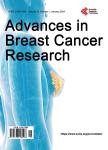Role of ESR Pathway Genes in Breast Cancer: A Review
Role of ESR Pathway Genes in Breast Cancer: A Review作者机构:Computational Biology Carnegie Mellon University in Qatar (CMU-Q) Doha Qatar Pennsylvania State University University Park USA Hematology and Oncology Department NCCCR Hamad Medical Corporation Doha Qatar
出 版 物:《Advances in Breast Cancer Research》 (乳腺癌(英文))
年 卷 期:2018年第7卷第2期
页 面:134-186页
学科分类:1002[医学-临床医学] 100214[医学-肿瘤学] 10[医学]
主 题:Estrogen Signaling Receptor (ESR) Pathway Breast Cancer ESR Genes Mechanistic Modeling Integrated Study Kyoto Encyclopedia of Genes and Genomes (KEGG) PubMed Literature Survey
摘 要:Breast cancer is the leading cause of death in women. Prognosis of breast cancer is often pessimistic because the tumors are prone to metastasizing to the bone, brain, and lung. The estrogen signaling receptor (ESR) pathway contains 39 main genes and proteins which makes it one of the larger signaling pathways. Predominately this pathway and the proteins within are involved in breast growth and development, making it a prospective area of study for breast cancer. While the healthy ESR pathway has been constructed and is well established, a mechanistic model of mutated genes of ESR pathway has not been delved upon. Such mutated models could be utilized for selecting combinational targets for drug therapies, as well as elucidating crosstalk between other pathways and feedback mechanisms. To construct the mutated models of the ESR pathway it is imperative to assess what is currently understood in the literature and what inconsistencies exist in order to resolve them. Without this information, a model of the ESR pathway will be unreliable and likely unproductive. This review is the detailed literature survey of the biological studies performed on ESR pathways genes, and their respective roles in breast cancer. Furthermore, the details mentioned in the review can be beneficial for the integrated study of the ESR pathway genes, which includes, structural and dynamics study of the genes products, to have a holistic understanding of the cancer mechanism.



